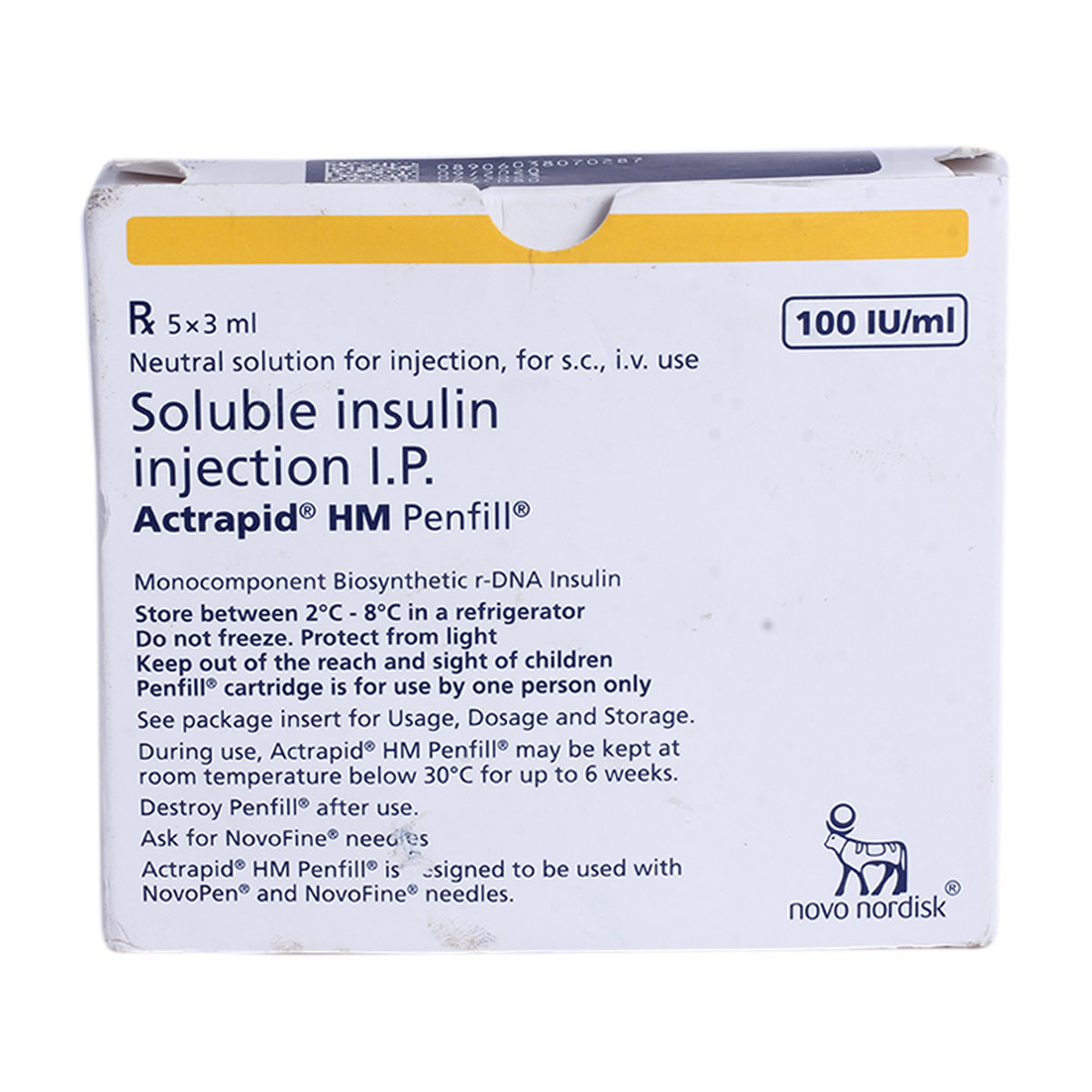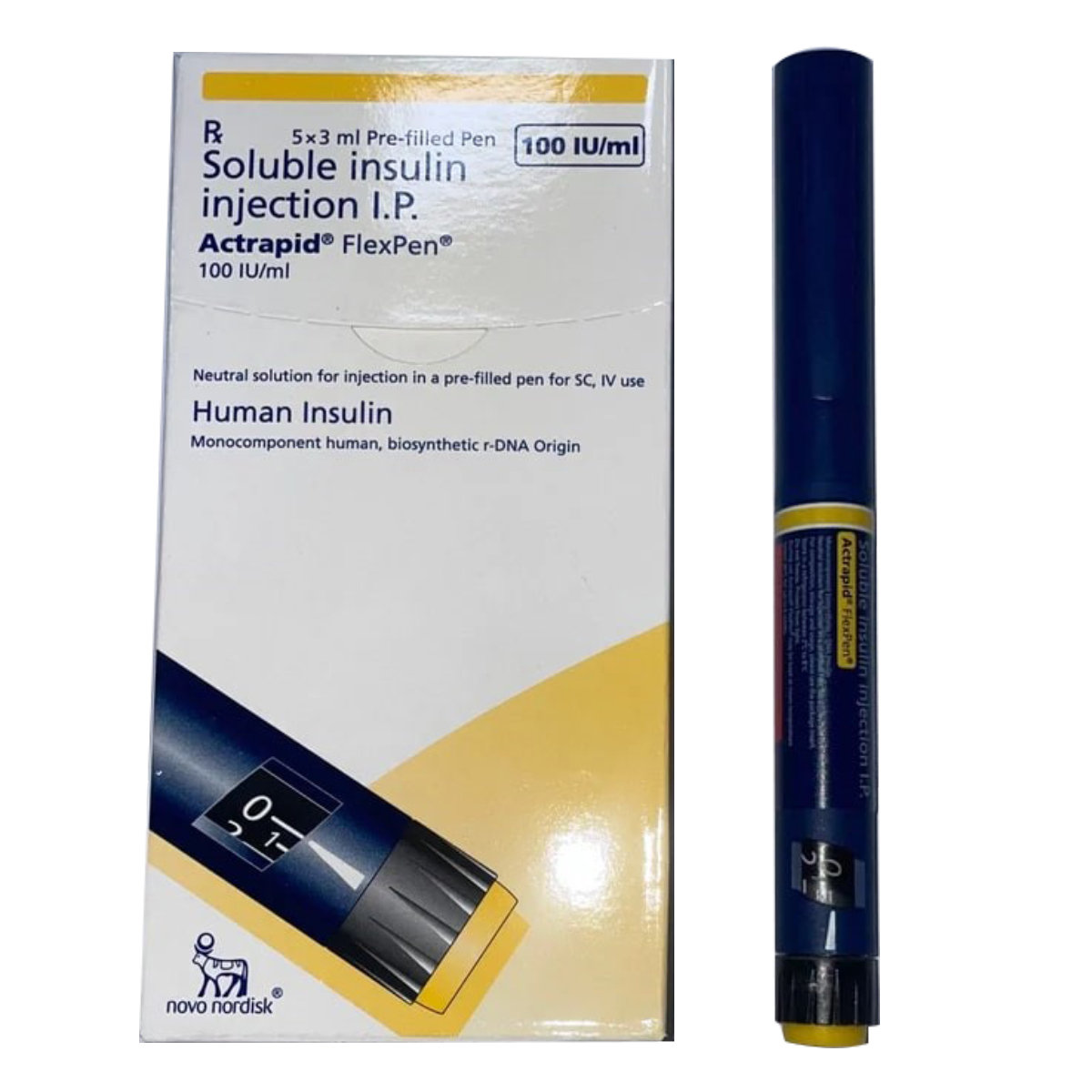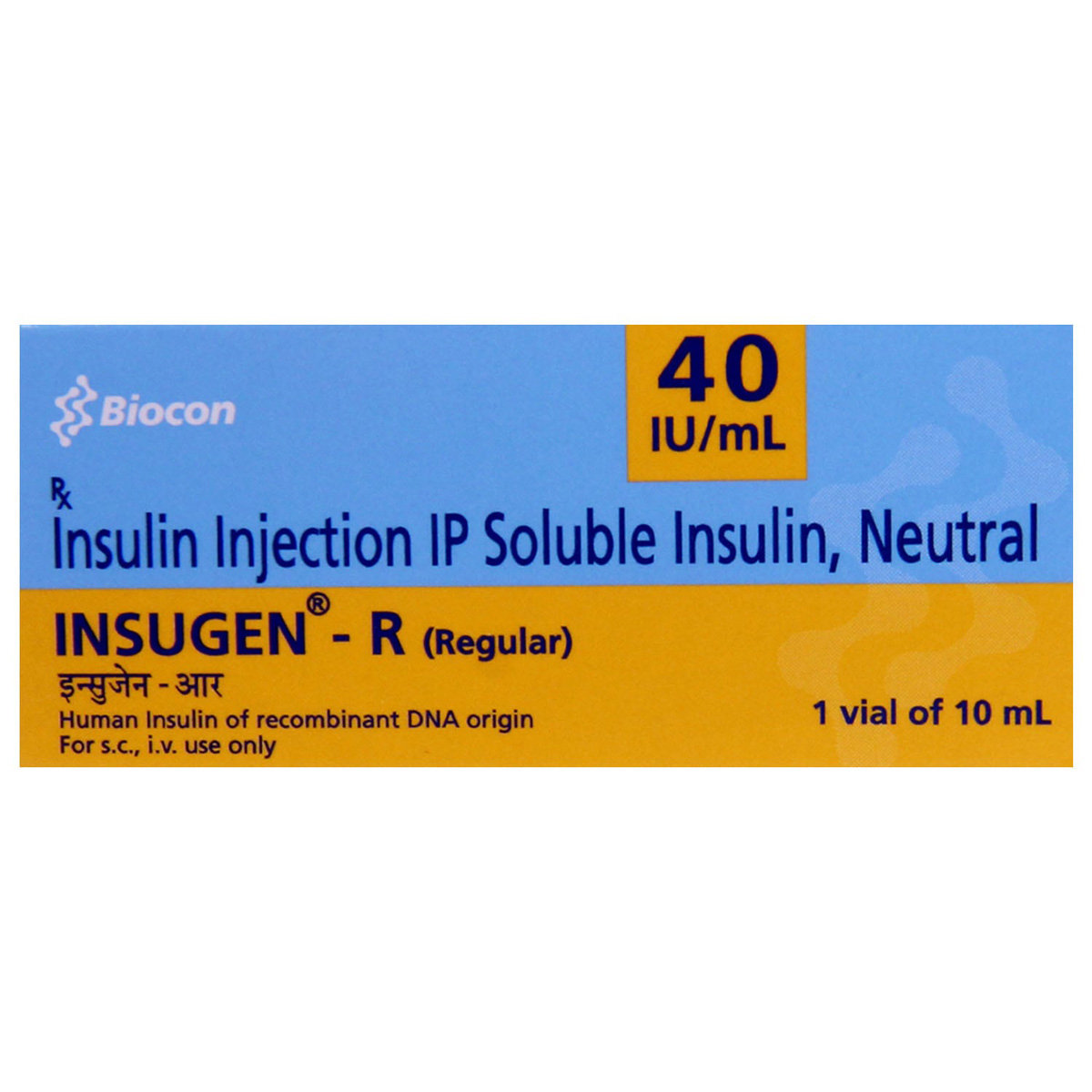Human Insulin
About Human Insulin
Human Insulin belongs to the group of medications called 'antidiabetics' used to treat type 1 and type 2 diabetes mellitus. Diabetes mellitus is a condition in which glucose levels are elevated in the body. In type 1 diabetes, the body does not make enough insulin (a hormone essential for glucose metabolism). In type 2 diabetes, either the body stops producing enough insulin or there is resistance to the action of insulin.
Human Insulin contains 'Human Insulin'. It replaces the deficient hormone 'insulin' in patients with diabetes. Human Insulin suppresses the production of sugar in the liver and facilitates the reuptake of sugar in the fat and muscle cells; thereby, Human Insulin ensures rapid and consistent sugar control. It starts to work within 30 min after injection, and its action lasts up to 8 hours.
Take Human Insulin as prescribed by your doctor. A healthcare professional will teach you how to take the injection. It can cause some side effects, such as low blood sugar, swelling in your hands or feet, weight gain, or thickening of the skin at the injection site. Consult your doctor if any of these side effects persist or get worsen.
Do not take Human Insulin if you are allergic to insulin or have an episode of hypoglycemia (low blood sugar). Talk to your doctor if you have a history of liver or kidney diseases and if you are pregnant or breastfeeding. Also, inform your doctor if you are taking any other anti-diabetic medications. If you experience an episode of hypoglycemia, seek medical attention immediately.
Uses of Human Insulin
Medicinal Benefits
Human Insulin contains Human Insulin that is a short-acting form of insulin. It helps lower blood sugar levels in both adults and children. It stimulates the recovery of sugar in muscle and fat cells and thus suppresses the production of sugar in the liver. Human Insulin helps in improving glycemic control which in turn decreases the risk of progression of complications of diabetes like damage of retina (retinopathy), damage of kidney (nephropathy), damage of nerve cells (neuropathy), delayed wound healing, diabetic foot ulcer, and others.
Directions for Use
Storage
Side Effects of Human Insulin
- Low blood sugar
- Swelling in your hands or feet
- Weight gain
- Thickening of the skin at the injection
Drug Warnings
Do not take Human Insulin if you are allergic to any of the contents. Inform your doctor if you have hypoglycemia (low blood glucose levels), hypokalemia (low levels of potassium in the blood), heart, kidney or liver problems. Consult a doctor before taking Human Insulin if you are pregnant or breastfeeding. Human Insulin may cause dizziness, so drive only if you are alert. You are recommended not to consume alcohol as it may cause unpleasant side effects. Care should be taken when you are travelling across more than 2 time zones; your doctor may adjust your insulin schedule.
Drug Interactions
Drug-Drug Interactions: Human Insulin may interact with antidiabetic medications such as thiazolidinediones (rosiglitazone and pioglitazone) and increase the risk of heart failure. It may also interact with antibiotics (levofloxacin, norfloxacin, and ofloxacin, etc), antidepressants, medications to treat high blood pressure (enalapril, lisinopril, captopril, losartan, valsartan, propranolol, and metoprolol), diuretics, medications used to treat heart diseases and cause hypoglycemia (low blood sugar).
Drug-Food Interactions: Try to avoid alcoholic beverages with Human Insulin as it may alter your blood glucose levels.
Drug-Disease Interactions: Inform your doctor if you have kidney disease, liver disease, low blood sugar level (hypoglycemia), and low potassium level (hypokalaemia).
Drug-Drug Interactions Checker List:
Safety Advice

Alcohol
unsafeIt is advised to avoid alcohol intake since it may worsen the side effects and increase the risk of developing low blood sugar levels.

Pregnancy
cautionIt is advised to use Human Insulin in pregnancy only if the benefit outweighs the risk. Please consult your doctor before starting Human Insulin if you are pregnant or planning to conceive.

Breast Feeding
cautionHuman Insulin should be used in breastfeeding mothers only if clinically needed.

Driving
cautionYour driving may be affected if your blood sugar levels are too high or too low. Do not drive or operate machinery if you also experience blurred vision, dizziness or drowsiness due to extremely low or high blood sugar.

Liver
cautionHuman Insulin should be used with caution in patients with liver diseases. Your doctor may adjust the dose of this medicine before prescribing it.

Kidney
cautionHuman Insulin should be used with caution in patients with kidney diseases. Your doctor may adjust the dose of this medicine before prescribing it.

Children
cautionHuman Insulin is not recommended for use in children below 2 years of age.
Habit Forming
Diet & Lifestyle Advise
- Include foods rich in healthy carbohydrates, fibre, fruits, whole grains, and vegetables in your diet.
- Try eating food at regular intervals. Do not skip meals. Also, try not to overeat.
- Follow a healthy diet and walk for at least a few minutes to complement treatment with Human Insulin.
- Maintain a healthy weight by exercising regularly.
- Rest properly, avoid stress by doing meditation or yoga.
Special Advise
If you feel any symptoms of hypoglycemia (fatigue, dizziness, confusion, heart palpitations, shakiness and anxiety), consult your doctor immediately.
Patients Concern
Disease/Condition Glossary
Diabetes mellitus: It is a metabolic disease that causes high blood sugar levels. Type 1 diabetes (juvenile diabetes) is an autoimmune disease in which the immune system attacks and destroys its own cells in the pancreas, thereby producing no insulin. It often occurs in childhood. Type 2 diabetes (adult-onset diabetes) occurs when the insulin (a hormone produced by the beta cells of the pancreas) is resistant in breaking the glucose to produce energy (insulin resistance) or the pancreas produces little or no insulin at all. Symptoms include frequent urination, increased thirst, hunger, and blurred vision. The treatment includes oral glucose-lowering medicines and insulin shots.
FAQs
Human Insulin works by increasing the glucose uptake by fats and muscles, suppresses the production of glucose in the liver, and also the formation of glycogen from glucose. Thereby, Human Insulin helps in reducing the glucose levels in the blood.
In hypoglycemia, blood sugar levels decrease significantly. It causes symptoms such as dizziness, headache, sweating, hunger, loss of consciousness, rapid breathing, or seizure (fits). In such cases, seek medical attention immediately.
If you experience low blood sugar, eat glucose tablets, chocolate, or another high-sugar snack, such as a sweet or biscuit. Use a blood glucose monitor to test your blood sugar levels after 15 minutes if possible.
Do not stop taking Human Insulin without consulting your doctor on your own as it may cause an increase in blood glucose levels. Continue taking Human Insulin for as long as your doctor has prescribed it to you. Do not be reluctant to speak with your doctor if you experience any difficulty while taking Human Insulin.
Available Medicines for
Human Insulin







